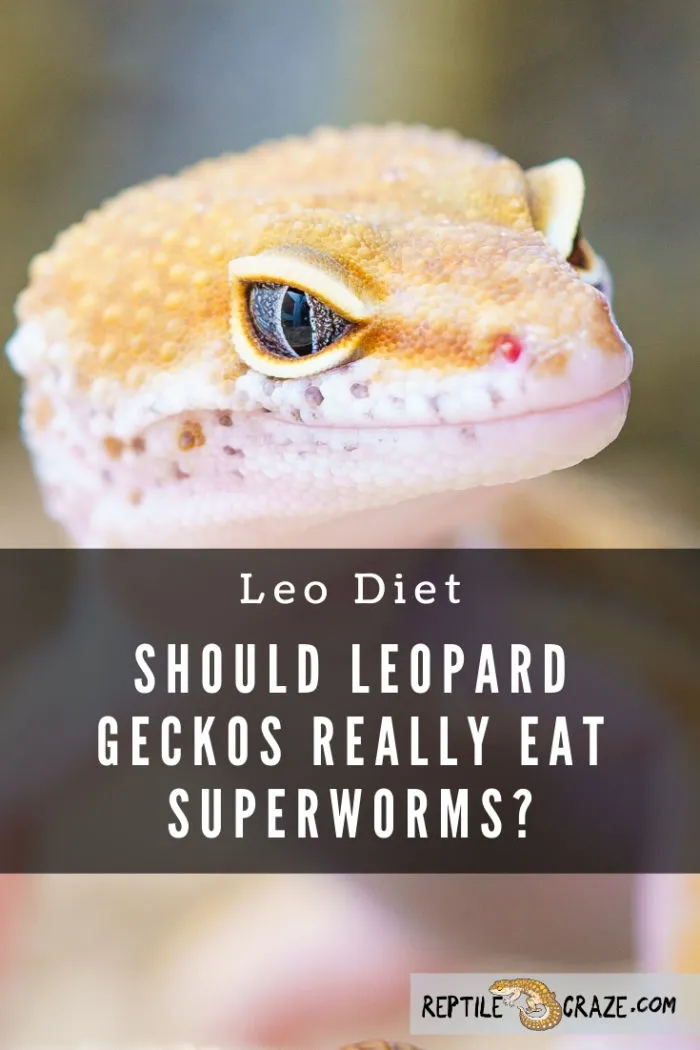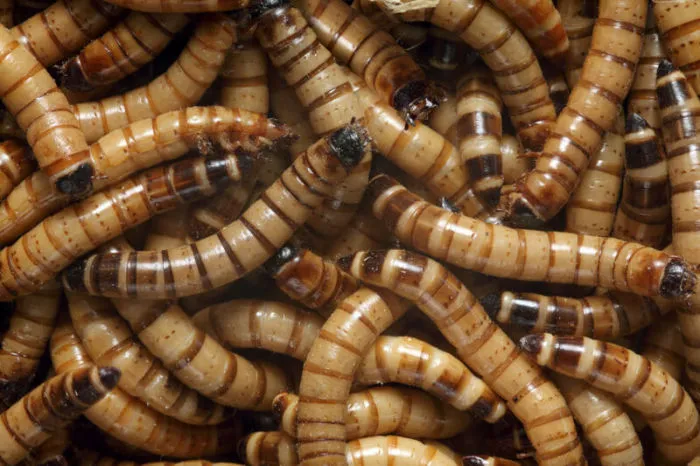 Superworms are just one of the many treats that leopard geckos can enjoy as part of a healthy, balanced diet. The real question is, what makes them a treat, and how often should they be fed?
Superworms are just one of the many treats that leopard geckos can enjoy as part of a healthy, balanced diet. The real question is, what makes them a treat, and how often should they be fed?
Can leopard geckos eat superworms? Yes, leopard geckos can absolutely eat superworms. However, these should be fed as a treat thanks to their high-fat content. Feeding too many of these particular worms can lead to obesity in your leopard gecko, which can have negative health consequences.
Now you know that you should keep superworms as an occasional treat. To learn about when and how many to give to your leopard gecko, keep on reading.
Table of Contents
How Many of Them Can They Eat in A Day or Week?
These worms should be fed sparingly because of their high-fat content as well as high phosphorus content.
Answers will vary from owner to owner, but to ensure leopard geckos are used to eating nutritious staples like crickets and mealworms and maintain healthy weights, these should be kept to a minimum.
Once per week or once every two weeks is just fine for most leopard geckos. Offering two or three of these worms are okay at a time- but no more than that, no matter how cute your gecko looks at you.
Try to keep the superworms appropriately sized for the leos. 3/8 of an inch are OK for babies, 1/ 4 inch is OK for juveniles, and adult-sized worms are OK for adult-sized leos.
What Are the Nutritional Values of Superworms?
The nutritional value of your superworms will depend on a few factors. Differences in how they are raised, what they eat, and more will all affect how your worms turn out.
Your best bet is to ask the supplier for nutritional content to get the exact scoop on what’s in them. Some keepers even choose to raise their own superworms.
To provide an example, here is a sample of nutritional content from a superworm supplier:
- 58% moisture
- 20% protein
- 18% fat
- 3% Fibre
- 177 mg Calcium per kg
- 2370 mg phosphorus per kg
From these values alone, you can really see why it is crucial to keep these insects as a special treat. Nearly one-fifth of their body is made up of fat!
Much like humans can become addicted to highly palatable foods; keepers have told stories of leopard geckos becoming addicted to highly palatable worms. Leopard geckos could eat these in droves if left to their own devices. Practice good keeping and set limits!

Do They Have to Be Dusted with Calcium?
Absolutely, yes! Leopard gecko owners need to choose a good supplement that will provide your leopard gecko the required calcium, especially when feeding this sort of worm with such a poor calcium to phosphate ratio.
We personally use ZooMed ReptiCalcium with Vitamin D3 for our leopard geckos.
All you have to do to dust the superworms is place them into a sandwich bag, add the calcium supplement, and give the bag a good shake until all the insects are coated. Then, you can drop them into the habitat and allow your leo to enjoy his treat.
Calcium supplementation is also important because there is LOTS of phosphorus in superworms. Phosphorus is definitely necessary for leopard geckos, but too much of it can lead to cardiovascular illness.
Phosphorus can also negate the health benefits of calcium, which is also a reason for supplementation and gut loading.
Do Superworms Need to Be Gut Loaded?
Yes, superworms should be gut loaded. 24 hours before you feed your reptiles their superworms, you can gut load them by feeding them nutritious, quality veggies and grains.
Oats are a great grain to feed, and sweet potato and carrots are quality veggies you can use for such a process.
To do this, place the superworms into a container with a piece of
The reasoning behind gut loading is simple: First off, it is unlikely the supplier has done it already (be sure to ask first). Second, this is a way for leopard geckos to get the nutrients they need from foods they cannot eat.
Leopard geckos are insectivores, meaning they eat insects solely. Thus, the need a way to get the benefits of veggies- and that is where gut loading of insects comes into play.
We also recommend reading these articles on our website:
What’s Good About Superworms?
The first thing you will probably hear about superworms from any herp fan or reptile keeper is that the fat content is very high and should be fed only at a minimum.
Yes, these things are true – but superworms are great in moderation for your leopard gecko, just as an occasional treat is good for other pets (and humans!)
Besides, sometimes that extra fat can come in handy. If a reptile is getting ready to lay eggs, extra nutrients will make the process, which is hard on the body much easier. They have not only extra fat, but also good protein content, too.
Protein is especially great for baby and juvenile leopard geckos, as it is the foundation for healthy muscles and organs that keep the body moving and processes like digestion and elimination functioning.
Using superworms is an excellent way to provide enrichment to your leopard gecko’s life. They will give your leopard gecko something to enjoy once a week or once every two weeks.
What’s Bad About Superworms?
The bad thing about superworms is that they are high in fat and feeding too many can lead your leopard gecko to become obese. What are the health effects of a leopard gecko becoming obese?
For starters, it’s not natural. Where leopard geckos come from, which is Southeastern Asia,
As a result, these reptiles have developed a unique way of keeping their bodies healthy even when
The tail should always be wider than the body, and the stomach of the gecko should remain flat, except after meals.
Overfeeding can lead the gecko to become lethargic and regurgitate
The poor calcium content and calcium to phosphorus ratio is another concern. Granted, we as leopard gecko owners will dust the
Also, superworms can hurt your leopard gecko! We explain how here!
Conclusion
Superworms are great for leopard geckos as they are akin to getting a treat. These will definitely make an excellent way to enrich the life of your leopard gecko, but they should be fed only once a week or every two weeks.
Exceptions can be made for females getting ready to lay eggs who need the extra nutrients. Enjoy feeding your leo this treat! If you would like to know about better worms to feed your leopard gecko, read our article here!
- Eastern Rat Snake: Nature’s Pest Control and Fascinating Reptile - September 20, 2024
- Eastern Racer: The Fast and Agile Snake - September 19, 2024
- The Eastern Indigo Snake: The Majestic, Non-Venomous Hunter of the Southeast - September 18, 2024
